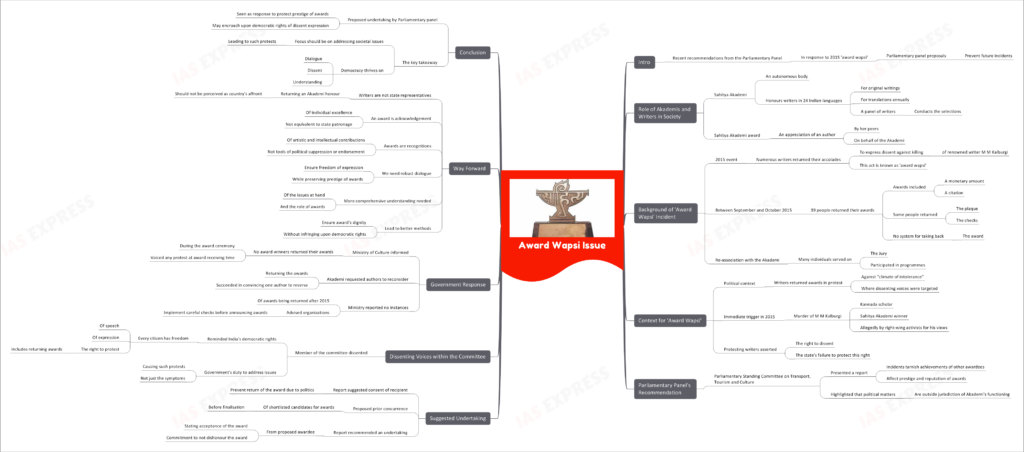Award Wapsi Issue- Recent Recommendations from the Parliamentary Panel

From Current Affairs Notes for UPSC » Editorials & In-depths » This topic
IAS EXPRESS Vs UPSC Prelims 2024: 85+ questions reflected
In response to the infamous 2015 ‘award wapsi’ incident, a Parliamentary panel has proposed recommendations to prevent future such incidents.

Role of Akademis and Writers in Society
- The Sahitya Akademi is an autonomous body. It honours writers in 24 Indian languages for original writings and translations annually. A panel of writers conducts the selections.
- The Sahitya Akademi award is an appreciation of an author by her peers on behalf of the Akademi.
Background of ‘Award Wapsi’ Incident
- In 2015, numerous writers handed back their accolades to the government to express their dissent against the killing of renowned writer M M Kalburgi from Karnataka. This act of returning awards is commonly referred to as ‘award wapsi’.
- Between September and October 2015, around 39 people returned their awards, which comprised a monetary amount and a citation. Some people also returned the plaque and checks associated with their awards, though the Akademi informed them that there was no system for taking back the award.
- Many of these individuals have re-associated with the Akademi and have served on the Jury and participated in programmes.
Context for ‘Award Wapsi’
- The ‘award wapsi’ had a political context. The writers returned their awards as an act of protest against the escalating “climate of intolerance” where dissenting voices were targeted.
- The immediate trigger in 2015 was the murder of Kannada scholar and Sahitya Akademi winner M M Kalburgi, allegedly by right-wing activists for his views.
- The protesting writers were asserting the right to dissent and the state’s failure to protect this right.
Parliamentary Panel’s Recommendation
- The Parliamentary Standing Committee on Transport, Tourism and Culture presented a report in both Houses of Parliament, stating that incidents involving the return of awards tarnish the achievements of other awardees and affect the prestige and reputation of the awards.
- It highlighted that political matters are outside the jurisdiction of the cultural and autonomous functioning of the respective Akademi.
Suggested Undertaking
- The report suggested that the consent of the recipient should be obtained whenever an award is given to prevent the return of the award due to political reasons.
- It also proposed “prior concurrence of shortlisted candidates for awards before finalisation”.
- The report recommended a system where an undertaking is taken from the proposed awardee, stating their acceptance of the award and their commitment to not dishonour the award at any future point.
Dissenting Voices within the Committee
- A member of the committee voiced dissent against such an undertaking, reminding that India is a democratic country where every citizen has the freedom of speech, expression, and the right to protest in any form, which includes returning awards.
- This dissenting member stated that the government’s duty is to address the actual issues causing such protests, rather than focusing on the symptoms of the underlying problems.
Government Response
- The Ministry of Culture informed the panel that none of the award winners had returned their awards during the award ceremony or voiced any protest at the time they received their awards.
- The Akademi requested the dissenting authors to reconsider their decision of returning the awards and even succeeded in convincing one author to reverse his decision.
- The Ministry reported no instances of awards being returned after 2015 and advised organizations to implement careful checks before announcing awards.
Way Forward
- Writers are not representatives of the state, and returning an Akademi honour should not be perceived as an affront to the country.
- An award is an acknowledgement of individual excellence and is not equivalent to state patronage.
- Understanding that awards are recognitions of artistic and intellectual contributions and not tools of political suppression or endorsement is crucial.
- We need a robust dialogue to ensure freedom of expression while preserving the prestige of awards.
- A more comprehensive understanding of the issues at hand and the role of awards can lead to better methods of ensuring the award’s dignity, while not infringing upon democratic rights.
Conclusion
While the proposed undertaking by the Parliamentary panel can be seen as a response to protect the prestige of awards, it may inadvertently encroach upon the democratic rights of individuals to express dissent. The key takeaway from this incident and subsequent proposal is that the focus should be on addressing underlying societal issues leading to such protests. Democracy, after all, thrives on dialogue, dissent, and understanding.
Practice Question for Mains
Discuss the potential implications of the recent Parliamentary Panel recommendations to avoid ‘award wapsi’. (250 words)
If you like this post, please share your feedback in the comments section below so that we will upload more posts like this.

